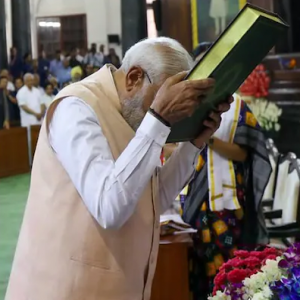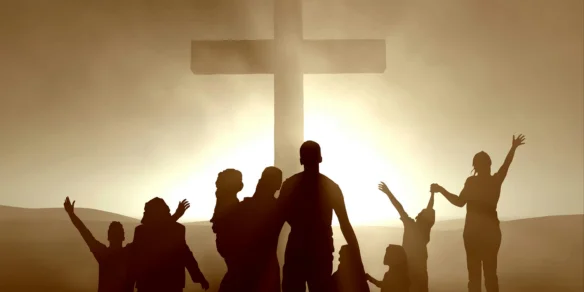
.png) Isaac Harold Gomes
Isaac Harold Gomes

In his speech in parliament on June 7, Prime Minister-designate Narendra Modi bowed and put the Indian Constitution on his forehead. He claimed he was an ardent practitioner of Sarva Dharma Sam Bhava, which is a concept of Hinduism, and says that the paths followed by all religions may be different, but their destination is the same. This concept was propounded by Ramakrishna Paramahamsa and Swami Vivekananda and adopted by Mahatma Gandhi. Yet the post-2024 election outcome shows that out of 293 seats of NDA (BJP's 240 seats), not a single MP is from other Dharmas, namely Muslims, Christians, Buddhists and Sikhs.
"It's not just the BJP, the NDA is Muslim mukt, Christian mukt, Buddhist mukt, Sikh mukt and yet the government will claim to represent 140 crore Indians," Omar Abdullah said in a tweet.
According to Congress MP Manickam Tagore from Tamil Nadu, if Modi believed in Sarva Dharma Sama Bhava, why is there not a single MP from the minority communities?
The statistics of the current NDA MPs show 33.2% belong to high-caste Brahmin-Kshatriyas, 15.7 to other high-caste groups, OBC 26.2, Dalits 13.3, and Adivasis 10.8% without any representation from Muslims, Christians, Buddhists, or Sikhs.
Of 543 Lok Sabha seats, 84 were reserved for SCs and 131 for STs. In the 2019 general election, the BJP won 46 SC seats. This time, it won only 30 (16 seats less). Of 131 seats reserved for STs, the BJP won 55 seats vis-à-vis the 77 it bagged in 2019. Therefore, even SC and ST voters have voted against Modi's claim to the Pursuit of Vikas.
It would be relevant to know party-wise votes cast by women voters. "Voters scripted history in 2024. Over 31 crore women cast their vote. Over 64 crore votes have been cast in these elections," Chief Election Commissioner Rajiv Kumar said during his press conference.
In this scenario, what's the way forward for the Christian Community? The development of Christians shouldn't be contingent on which party comes to power at the Centre. It should be an ongoing process across all dioceses.
1. We must look within and develop ourselves by undergoing intensive, cutting-edge human resource development, including vocational training, at each parish/diocese. In the global market, the quality and raising the bar of our laity will matter.
2. Though each vote matters regarding numerical strength, except in north-eastern states, Kerala and Goa, Christians are not a decisive factor. They are also no match vis-a-vis other communities. For example, Muslims who form a sizable percentage in Kerala, Uttar Pradesh, Jammu & Kashmir, Ladakh and West Bengal (35% out of an estimated 10.42 crore population), stamped their displeasure undeterred by a highly-polarised vitriolic election pitch. Readers will find the Telegraph's July 8 Editorial "India Didn't Fall for the Prime Minister's Theatrics" enlightening in this context.
3. Fee increases in our missionary educational institutions must be kept reasonable, considering the post-COVID erratic employment scenario and the average annual pay rise of 5-7%. Reserve Funds may be tapped to meet the budget deficit.
4. Primary healthcare, especially mother-and-child health, must be paid attention in each parish/cluster parish. The Health Commissions of each parish/diocese must play their proactive roles.
5. Also, the increase in the number of Christian professionals, especially Christian MPs, will be crucial for the growth of our community.
Therefore, in keeping with the Spirit, the Church should reciprocate with its resources and underutilised facilities.